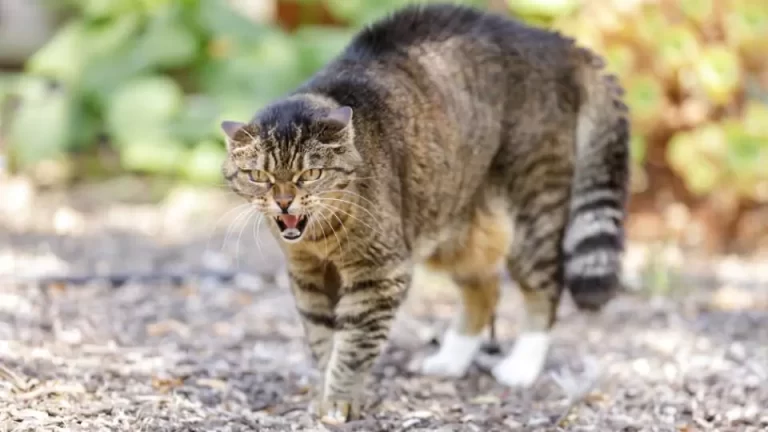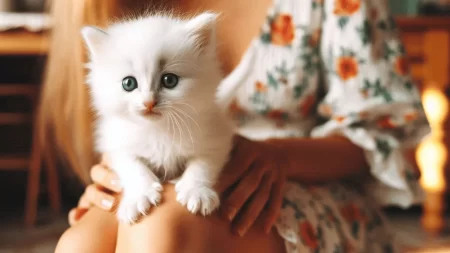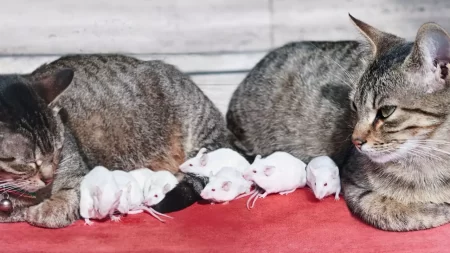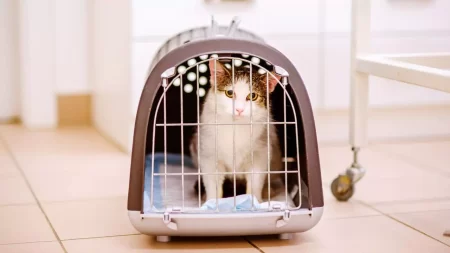Cats can’t hold active grudges, as their brains only retain short-term memories for up to 16 hours. However, they may demonstrate behavior that looks like a grudge, but it probably doesn’t have the same underlying causes as a human grudge.
Cats generally forgive quickly, especially if you already get along well with them. For many cats, small offenses are forgotten quickly, so it’s likely that everything will be okay in a few hours to days. It may look like kittens are easier to forgive than older cats, but they don’t remember things as well.
The amount of time that cats can remember things is very long—from a few weeks to a few years. Cats only remember a few people or places in their long-term memory, but they can remember them for a long time.
Do Cats Actually Hold Grudges?
A grudge is defined as “a persistent feeling of ill will or resentment resulting from a past insult or injury”. A negative association, on the other hand, is “a learned response to a stimulus that results in an unpleasant or harmful outcome”.
Cats don’t hold grudges in the same way that humans do. Instead, they associate certain actions and behaviors with negative and positive events. Based on these associations, they react differently.
Cats might not need to hold grudges because they’re not as social as humans and don’t resolve conflicts in the same way. In fact, cats have systems in place to avoid conflict.
Signs of a Grumpy Cat
How can you tell if your cat is holding a grudge against you or someone else? Here are some common signs of a grumpy cat:
- Avoidance of owner: A cat that is holding a grudge may avoid or ignore their owner, or even hide from them. They may refuse to interact, play, or cuddle with them, or show signs of fear or anxiety when approached.
- Negative body language: A cat that is holding a grudge may show negative body language, such as flattened ears, narrowed eyes, dilated pupils, arched back, or puffed tail. They may also hiss, growl, or spit at their owner or the source of their grudge.
- Excessive vocalizations: A cat that is holding a grudge may vocalize more than usual, especially in a loud or angry tone. They may meow, yowl, or howl to express their discontent or frustration.
- Aggressive behavior: A cat that is holding a grudge may resort to aggressive behavior, such as scratching, biting, or attacking their owner or the source of their grudge. They may also display territorial or defensive behavior, such as spraying, marking, or guarding their resources.
Causes of Grumpiness in Cats
What can cause a cat to hold a grudge in the first place? Here are some possible causes of grumpiness in cats:
- Changes in routine: Cats are creatures of habit and like to have a predictable and consistent routine. Any changes in their routine, such as feeding time, playtime, or sleeping time, can upset them and make them feel insecure or stressed.
- Negative experiences: Cats can hold a grudge if they have had a negative experience with their owner or someone else, such as being scolded, punished, or mistreated. They can also hold a grudge if they have witnessed or been involved in a traumatic event, such as a fight, an accident, or a visit to the vet.
- Stressors: Cats can hold a grudge if they are exposed to stressors, such as new people, animals, or objects in their environment, loud noises, unfamiliar smells, or lack of resources. They can also hold a grudge if they feel threatened or challenged by another cat or animal, especially if they are not properly introduced or socialized.
How to Fix a Grudge-Holding Cat?
If your cat is holding a grudge against you or someone else, don’t worry. There are ways to fix a grudge-holding cat and restore your relationship. Here are some tips:
Rebuilding Trust and Apologizing
The first step to fixing a grudge-holding cat is to rebuild trust and apologize. You can do this by respecting their space and boundaries, giving them positive attention and affection, and offering them treats or toys. You can also use a calm and soothing voice, and avoid any harsh or sudden movements. You can also try to mimic their body language, such as blinking slowly, to show them that you are friendly and not a threat.
Changes in Routine or Environment
The second step to fixing a grudge-holding cat is to make changes in their routine or environment to reduce their stress and increase their comfort. You can do this by providing them with a safe and cozy place to hide or relax, such as a cat bed, a box, or a shelf. You can also provide them with enough food, water, litter, and toys, and keep them clean and well-groomed. You can also try to minimize any sources of noise, smell, or disturbance in their environment, and use calming products, such as pheromones or herbs, to help them relax.
Seeking Professional Help if Needed
The third step to fixing a grudge-holding cat is to seek professional help if needed. If your cat’s grudge is severe or persistent, or if they show signs of physical or mental illness, such as weight loss, vomiting, diarrhea, or depression, you should consult your vet or a cat behaviorist. They can help you diagnose and treat any underlying issues, and provide you with more advice and guidance on how to fix a grudge-holding cat.
Tips for Avoiding Negative Associations in the Future
The final step to fixing a grudge-holding cat is to avoid creating negative associations in the future. You can do this by being gentle and patient with your cat and avoiding any actions that may upset or hurt them, such as yelling, hitting, or forcing them to do something they don’t want to do. You can also try to make positive associations with things that they may dislike, such as the vet, the carrier, or the nail clippers, by using treats, toys, or praise. You can also try to introduce them to new people, animals, or objects gradually and carefully, and use positive reinforcement to reward them for being calm and friendly.







